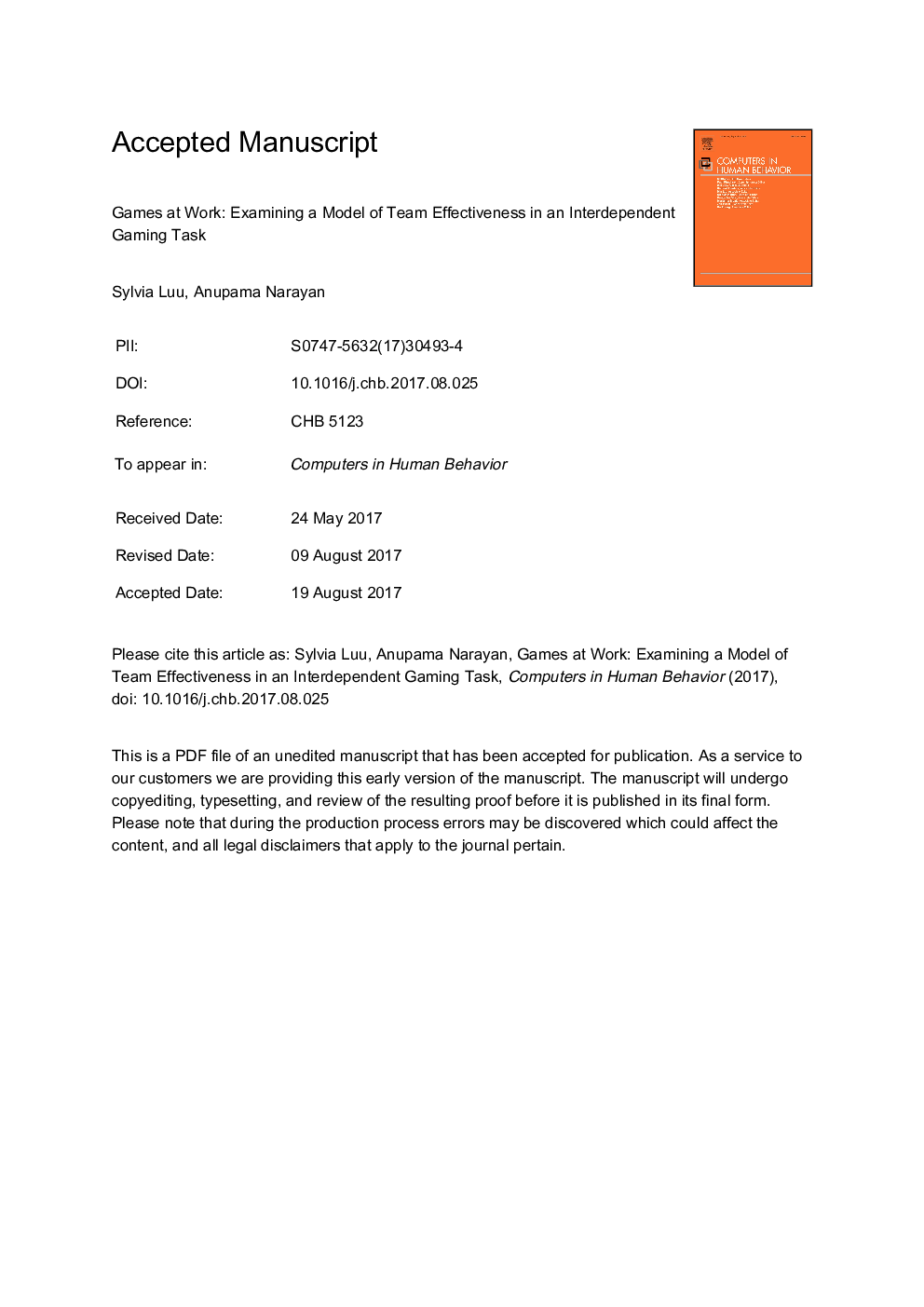| کد مقاله | کد نشریه | سال انتشار | مقاله انگلیسی | نسخه تمام متن |
|---|---|---|---|---|
| 4937032 | 1434614 | 2017 | 52 صفحه PDF | دانلود رایگان |
عنوان انگلیسی مقاله ISI
Games at work: Examining a model of team effectiveness in an interdependent gaming task
ترجمه فارسی عنوان
بازی در محل کار: بررسی یک مدل از کارایی تیم در یک بازی مشروط به بازی
دانلود مقاله + سفارش ترجمه
دانلود مقاله ISI انگلیسی
رایگان برای ایرانیان
کلمات کلیدی
تیم ها، رضایت کار، انگیزه، ارتباطات، کارآیی جمعی، تولید
ترجمه چکیده
به طور کلی، این مطالعه بر اهمیت تفکر چند سطح و تاثیر بالقوه تولید در کارهای تیم تاکید می کند. در پژوهش حاضر، روابط بین انگیزش درونی متون متنی، مهارت های ارتباطی، کارایی جمعی، و رضایت در یک محیط بازی همه جانبه، مورد بررسی قرار می گیرد. علاوه بر این، رضایتمندی با هر دو ارزیابی خود و ارزیابی تیم مورد بررسی قرار گرفت تا بررسی کند که آیا مفاهیم فردی و گروهی در یک کار متقابل متفاوتی تحت تأثیر قرار می گیرند. کارآیی جمعی نیز به عنوان یک نظارت بر سطح روابط بین ورودی ها و نتایج در سطح فردی ارزیابی شد. نتایج بر اهمیت تفکیک بین ارجاعات فردی و تیمی تاکید می کند. رضایت از اعضای تیم و رضایت از کار گروهی پیش بینی کننده های مختلفی داشتند، گرچه برخی از همپوشانی ها وجود داشت. نتایج نشان می دهد انگیزه بازی فردی، مثبت رضایت کار گروهی را پیش بینی می کند، اما رضایت فردی نیست. مهارتهای ارتباطی افراد و اثربخشی جمعی هر دو تأثیر مثبت مستقیم بر رضایت شغلی فرد و گروه داشتند. با این حال، با توجه به تعاملات متقابل، تنها تعامل معنادار بین مهارتهای ارتباطی و کارآیی جمعی در پیش بینی رضایت فرد بود.
موضوعات مرتبط
مهندسی و علوم پایه
مهندسی کامپیوتر
نرم افزارهای علوم کامپیوتر
چکیده انگلیسی
Overall, this study emphasizes the importance of multi-level thinking and the potential influence of gamification in team tasks. The current study explores the relationships between contextualized intrinsic motivation, communication skills, collective efficacy, and satisfaction in an immersive, computer game context. Moreover, satisfaction was examined with both self- and team-referents to investigate whether self- and team-concepts are affected differently within an interdependent task. Collective efficacy was also assessed as a cross-level moderator on the relationships between individual-level inputs and outcomes. The results emphasize the importance of distinguishing between individual- and team-level referents. Team member satisfaction and group task satisfaction had different significant predictors, though there was some overlap. Results suggest individual's game motivation positively predicts group task satisfaction, but not individual satisfaction. Individuals' communication skills and collective efficacy both had positive direct effects on both individual and group task satisfaction. In terms of cross-level interactions, however, the only significant interaction was between communication skills and collective efficacy in predicting individual satisfaction.
ناشر
Database: Elsevier - ScienceDirect (ساینس دایرکت)
Journal: Computers in Human Behavior - Volume 77, December 2017, Pages 110-120
Journal: Computers in Human Behavior - Volume 77, December 2017, Pages 110-120
نویسندگان
Sylvia Luu, Anupama Narayan,
